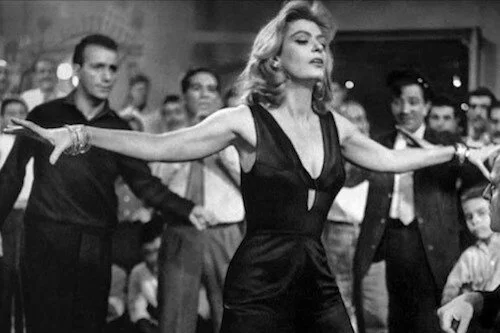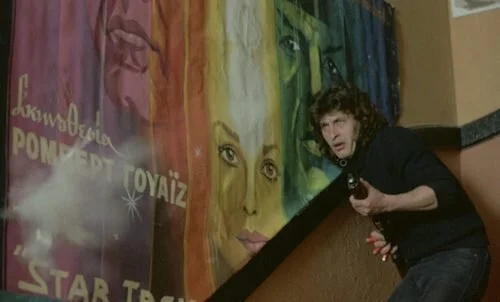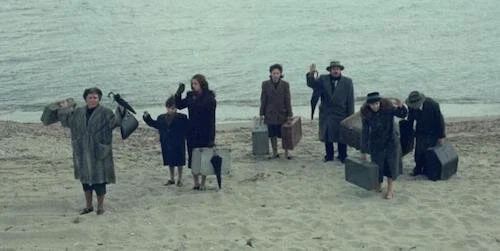Ten of the Greatest Greek Films of All Time
Until recently, an industry within film that has gotten the short end of the stick a little bit is that of the Greek film industry. What could have been as pivotal as Russian, French, or American cinema from the very beginning of the medium, Greece’s film industry has continuously been stymied by politics, including cutbacks due to both World Wars (amongst other major events). One of two major outcomes occurred as the result of this stunting of growth: filmmakers would work internationally (some of whom will be seen below), or the local cinema became rebellious. Considering that Greek cinema is bigger than it has been in years, it’s never too early or too late to celebrate. Here are ten of the greatest Greek films of all time.
For this list, I’m limiting one entry per filmmaker, and have tried to focus on films shot in Greece, and/or with Greek performers and crew members, and spoken completely or mainly in Greek.
Bonus: The Weavers (by the Manaki Brothers)
Right at the start of cinema were Yanaki and Milton Manaki, whose works at the turn of the twentieth century are imperative to the medium. One key example is their first film The Weavers (part of which is featured here). It didn’t feel right to go forwards without discussing such an important part of Greek film history, which paved the way for Greek directors ever since (Theo Angelopoulos even features the short in Ulysses’ Gaze: his homage to cinema as a whole).
10. Never on Sunday
National superstar Melina Mercouri worked with numerous Greek auteurs, including Jules Dassin, on a frequent basis at one point. Their finest film together is Never on Sunday: a rom-com that was a fantastic introduction for international audiences to the cinema and daily cultures of Greece (during the golden years of Greek cinema). This gameplay ended up in the film being the most successful partnership of the two, resulting in Academy Awards nominations for Dassin (for his screenplay) and Mercouri (for Best Actress).
9. Electra
Michael Cacoyannis would be most well known for Zorba the Greek, but his purely Greek works are worth mentioning as well. In his Greek Tragedy trilogy, there are two noteworthy entries (including Iphigenia). Since we can only go with one, let’s select Electra which is deeply rooted in mythological subtext. An adaptation of the pice of the same name by tragedian Euripides, Electra is a melodrama that would put Cacoyannis on the map for eternity.
8. Attenberg
The recent influx of interest in Greek films comes from the New Weird Greek Wave Cinema movement: counterculture works that fight back against cinematic and political authority. One such film is Athina Rachel Tsangari’s Attenberg: an against-the-grain slice of a spiritual awakening. Featuring the exploration of sexuality and the refusal to conform after a lifetime of limitations, Attenberg captures the frustrations of abiding to constricting order, told with a 2010’s lens that truly sells the narrative.
7. The Auntie from Chicago
Right in the heard of the golden years of Greek cinema is a crowd pleasing effort from Alekos Sakellarios titled The Auntie From Chicago. It’s a culture clashing comedic event, with a Greek native returning home after living in America, only to create some change within her brother’s family’s life. One of the more digestible works within the celebrated collection of Greek films, The Auntie From Chicago is a fun getaway from life for a little while.
6. The Red Lanterns
In the 1960’s, Vasilis Georgiadis was quite successful worldwide, even nabbing two Academy Award nominations for Best International Feature Film (once for Blood on the Land). His first major triumph of this kind was The Red Lanterns: a progressively unorthodox take on society with an attempt at the female gaze. Featuring multiple female characters who are sex workers, and the notion of religion being an integral part of Greek culture (the questioning of God’s presence during one’s darker times), The Red Lanterns feels like the kind of work that New Hollywood would try to come around to a few years later (when world cinema was already leagues ahead).
5. The Counterfeit Coin
The riveting The Counterfeit Coin feels like Yorgos Tzavellas’ answer to Italian Neorealism, with a heavy emphasis on the difficulties of being subsumed by a society. With authentic and artificial approaches to getting by, The Counterfeit Coin is a series of tales with the need to survive at their core. With these stories clashing with one another, the woes of one will hurt harder after the lies of another. It’s a superb juxtaposition of lives within society’s conventions.
4. Sweet Bunch
For a few years, Nikos Nikolaidis predated the more experimental Greek works later on, by going a little bit more strange than the arthouse films of his Hellenic contemporaries. His finest achievement is Sweet Bunch, which felt like a neon, synth-driven homage to Sam Peckinpah’s The Wild Bunch (only with an obvious sense of sarcasm). Four delinquents vow to explore evil, knowing that their days might be numbered. As colourful as it is uneasy, Sweet Bunch is an onslaught of contradictions, with almost all of them being home runs.
3. Dogtooth
Greece’s most successful current export is the savage satire mastermind Yorgos Lanthimos, known for his insane successes The Favourite, The Lobster, and The Killing of a Sacred Deer. Before he unleashed his oddities upon us, he broke ground in the New Weird Greek Wave Cinema movement with Dogtooth. With parents that have locked their children within their own home, and created a series of lies to keep them there, Dogtooth becomes a series of perversions derived from delirium and corruption. An allegory of a society turning in on itself under constricting politics, Dogtooth is completely bonkers.
2. The Ogre of Athens
Possibly the high point of Greece’s golden years of cinema is Nikos Koundouros’ crime satire The Ogre of Athens: a different take on mistaken identity. With power handed to the wrong person (a humble person erroneously labeled as the king of the criminal underworld), The Ogre of Athens could have been a straight up comedy. Instead, Koundouros creates a meaningful connection to the reality of things, by mirroring corruption and evil with this peculiar cinematic mistake that’s delightfully cynical.
1. The Travelling Players
Of course, it is virtually impossible to discuss Greek cinema without bringing up the legend himself Theo Angelopoulos. While it is difficult to discuss only one of his works (Eternity and a Day is a stunning gem of a film, for instance), it’s also easy to go straight to The Travelling Players as his magnum opus. An epic that weaves through time, space, consciousness, and reality, The Travelling Players is an ambitious exploration of history and culture in an extremely unconventional way. As aesthetically gorgeous as it is philosophically rich, The Travelling Players is a strong candidate for Greece’s finest film through and through.
Andreas Babiolakis has a Masters degree in Film and Photography Preservation and Collections Management from Ryerson University, as well as a Bachelors degree in Cinema Studies from York University. His favourite times of year are the Criterion Collection flash sales and the annual Toronto International Film Festival.













